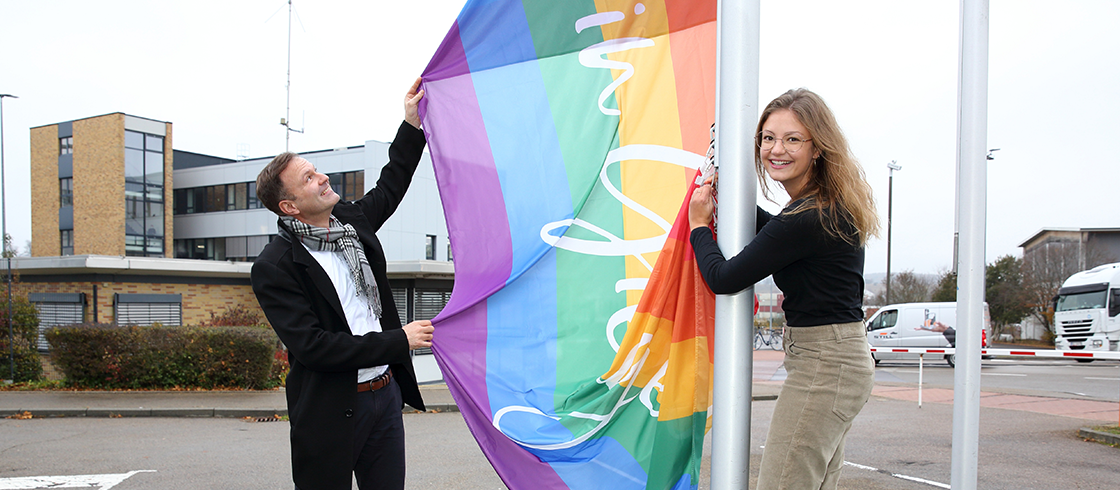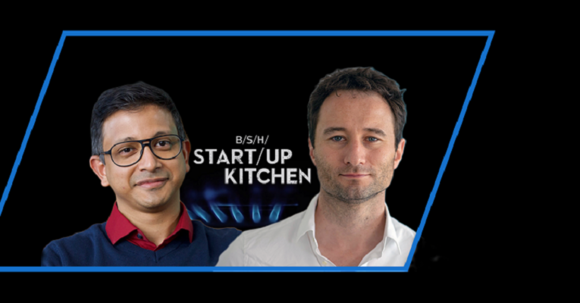Strong commitment – throughout the year
Reading time for this article: 5 minutes
The time for rainbows at companies is commonly Pride Month. However, commitment to diversity must be an issue in corporations throughout the year. A rainbow flag was raised at the BSH site in Giengen in the fall of 2021. We took this as an opportunity to ask ourselves what value such symbols can create internally and externally, and talked in Giengen to Jochen Heel, who initiated the action, and Karina Bartschat, Diversity Ambassador.
Social diversity in society has many dimensions. Belonging to the LGBT*QI+ community is only one of them. Members of the community experience on a daily basis the acceptance but also the resistance when the realities of their lives are made visible. For many people outside the community, awareness of this only rises on special Awareness Days or during Pride Month. Or when a small local action causes internal discussions within the company …
Fostering awareness through visibility
Jochen Heel initiated the raising of the rainbow flag at the Giengen site. “The idea came about quite spontaneously,” he says. “My favorite soccer club played with a special jersey in rainbow colors. They clearly communicated that the dignity and rights of all are important, and discrimination should have no room. I found that very impressive. It showed me that every person can do something with simple means. Because it is also true that there is only good if you do good. That’s why I initiated the idea with the flag in rainbow colors. I wanted to set a visible sign. We should start with ourselves, with the person in the mirror looking back at us. We should ask ourselves: How can I support?”
Strong allyship – realizing your responsibility
Working in a diverse team relies on personal exchange, since one cannot expect everyone to know what it is like to have particular experiences in a community that one does not belong to. To inform each other about it – that is valuable educational work. Often, this work is done by those who belong to individual minority groups. This makes diversity more visible in companies but can also be stressful for the respective colleagues. That’s why strong allies are needed to foster inclusion and equal opportunities for all.
An ally is a person who commits themselves to support the members of a minority group that they do not belong to, and fight against the discrimination that others face – for example, a heterosexual person who supports the rights of homo-, bi-, pan- and asexual people.
Jochen Heel did not initiate the action in Giengen because he has a special role in the issue of diversity in his department or at the site: “I have a significant role as a person and a leader, and diversity is a matter of the heart for me.” Becoming aware of one’s own social responsibility is essential for proactively encouraging and implementing support for people who experience discrimination.
Setting a sign is just the beginning
But does raising the flag mean that everyone at the site is sensitive to the concerns of queer colleagues? Heel initiated the action, but the workforce understood and supported the idea immediately. The team not only committed to its meaning but also helped out with the realization of the initiative. How does Heel assess the situation at BSH as a whole? “We are on a good path. Many things have changed for the better. You can sense an ever-increasing openness among colleagues, but there is still a lot to do.”
Setting a sign in solidarity with the LGBT*QI+ community is only meaningful if a look behind the scenes reveals that there is, indeed, a shift in thinking towards a more inclusive corporate culture. The primary goal of such actions should not be the positioning or the profit of the company but the support of queer colleagues. Smaller actions at specific locations often have more impact than large-scale campaigns.
Initiate and encourage internal discussions
Equally important is understanding how diverse the LGBT*QI+ community is, how different the needs and views are in terms of support from global companies. In every single action, the initiators are first and foremost the ones who spark a conversation. Even the internal discussions that can arise have value for the cultural growth of a company and can raise awareness of social responsibility in different teams. If an action is met with a lack of understanding, this is a clear indication that there is a need for education in special trainings or for the establishment of support networks – for example the annual Diversity Week from colleagues for colleagues with key notes and workshops. There, the participants had a safe forum to exchange their ideas and experiences with topics like unconscious bias and discrimination.
Top-down and bottom-up – when everyone works towards one goal
Corporate values, special structures and processes that enable diversity, equity and inclusion – these are the foundations for promoting diversity-related topics internally and externally. On the one hand, resources are needed from top management, on the other hand, feedback through employee networks is also needed in order to further expand these structures. For example, thanks to the initiative of the BSH’s LGBT*QI+ network Colors of BSH, the PROUT AT WORK Foundation nominated four BSH employees for list positions: Dr. Carla Kriwet, CEO BSH Home Appliances, in the “Executive Ally” category, Marc Hantscher, Executive Vice President, as “PROUT Executive”, Carlos Sanchez Albir, Project Lead in Customer Service, and Claudia Strauch, Global L&D Application Manager, as “PROUT Voices”. This nomination is a valuable recognition of the commitment of our colleagues but also a challenge to continue to work proactively towards a more inclusive corporate culture, for example by becoming a member of the “Colors of BSH” network, even as an ally.




